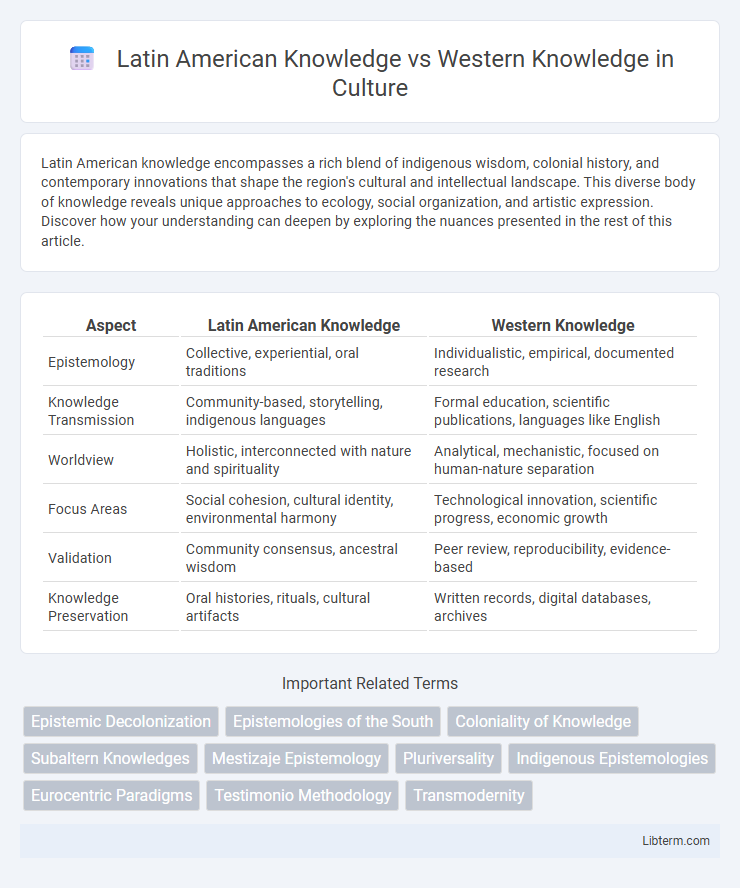Latin American knowledge encompasses a rich blend of indigenous wisdom, colonial history, and contemporary innovations that shape the region's cultural and intellectual landscape. This diverse body of knowledge reveals unique approaches to ecology, social organization, and artistic expression. Discover how your understanding can deepen by exploring the nuances presented in the rest of this article.
Table of Comparison
| Aspect | Latin American Knowledge | Western Knowledge |
|---|---|---|
| Epistemology | Collective, experiential, oral traditions | Individualistic, empirical, documented research |
| Knowledge Transmission | Community-based, storytelling, indigenous languages | Formal education, scientific publications, languages like English |
| Worldview | Holistic, interconnected with nature and spirituality | Analytical, mechanistic, focused on human-nature separation |
| Focus Areas | Social cohesion, cultural identity, environmental harmony | Technological innovation, scientific progress, economic growth |
| Validation | Community consensus, ancestral wisdom | Peer review, reproducibility, evidence-based |
| Knowledge Preservation | Oral histories, rituals, cultural artifacts | Written records, digital databases, archives |
Defining Latin American Knowledge
Latin American Knowledge emphasizes indigenous worldviews, communal values, and historical experience distinct from Western epistemologies rooted in individualism and rationalism. It integrates ancestral wisdom, oral traditions, and socio-political struggles, challenging dominant paradigms imposed through colonization and modernization. This knowledge system promotes pluriversality, recognizing multiple realities and forms of knowing beyond Western scientific frameworks.
Foundations of Western Knowledge
Western knowledge foundations are deeply rooted in Greco-Roman philosophy, Enlightenment rationalism, and scientific empiricism, emphasizing systematic inquiry and universal principles. Latin American knowledge incorporates indigenous wisdom, colonial histories, and hybrid epistemologies, challenging Western paradigms by foregrounding context, community, and oral traditions. The contrast highlights Western knowledge's prioritization of abstraction and codification against Latin America's emphasis on relational and lived experiences.
Epistemological Differences
Latin American knowledge emphasizes collective wisdom, indigenous traditions, and context-specific understanding, contrasting with Western knowledge's focus on individualism, universal principles, and empirical methodologies. Epistemologically, Latin American frameworks value oral histories and relationality, challenging Western paradigms that prioritize objective, rational analysis and standardized scientific methods. This divergence highlights the importance of integrating pluriversal epistemologies to enrich global knowledge production and decolonize dominant narratives.
Historical Contexts and Influences
Latin American knowledge systems, deeply rooted in Indigenous, African, and colonial histories, emphasize holistic worldviews, community-centered practices, and oral traditions, contrasting with Western knowledge's foundations in Enlightenment rationalism, scientific empiricism, and individualism. The colonial legacy imposed Western epistemologies, often marginalizing native knowledge and disrupting traditional knowledge transfer across generations. Despite this, Latin American intellectual movements increasingly reclaim and integrate diverse historical influences to challenge Western-centric paradigms and promote epistemic pluralism.
Indigenous Wisdom and Oral Traditions
Indigenous wisdom in Latin America, grounded in centuries-old oral traditions, offers a holistic understanding of ecosystems, community relationships, and sustainable practices distinct from Western knowledge systems often based on empirical data and written records. These oral narratives preserve ancestral insights into agriculture, medicine, and spirituality, emphasizing harmony with nature and collective well-being. Integrating indigenous knowledge with Western methodologies enriches cultural diversity and supports innovative solutions to environmental and social challenges.
Colonial Legacies Shaping Knowledge
Colonial legacies have profoundly shaped the divergence between Latin American knowledge systems and Western knowledge by embedding Eurocentric epistemologies that marginalized indigenous and afro-descendant worldviews. The imposition of Western educational institutions and languages systematically devalued local knowledge practices, creating enduring knowledge hierarchies. Contemporary efforts in Latin America emphasize decolonizing knowledge to reclaim and integrate ancestral wisdom with global academic frameworks.
Western Science and Rationality
Western science emphasizes empirical methods and rationality as foundations for knowledge, prioritizing objectivity, reproducibility, and systematic experimentation. Latin American knowledge often integrates indigenous wisdom, cultural context, and holistic perspectives, challenging Western science's universality by valuing relational and experiential ways of understanding. The contrast highlights differing epistemologies: Western rationality seeks universal laws, while Latin American approaches emphasize localized, relational knowledge systems.
Hybridities and Syncretism in Thought
Latin American knowledge systems exhibit rich hybridities and syncretism by blending indigenous, African, and European intellectual traditions, creating a unique epistemological framework distinct from Western knowledge. This fusion challenges traditional Western paradigms by integrating communal values, spirituality, and localized experiences intertwined with scientific and philosophical thought. Such hybrid epistemologies promote a pluralistic understanding of knowledge that resists homogenizing narratives and emphasizes intercultural dialogue and coexistence.
Power Dynamics in Knowledge Production
Power dynamics in knowledge production reveal significant disparities between Latin American and Western knowledge systems, where Western paradigms often dominate institutional and academic spaces globally. Latin American knowledge challenges this hegemony by emphasizing indigenous, local, and decolonial perspectives that resist the epistemic dominance of Western methodologies. This contestation reshapes global knowledge hierarchies, advocating for pluralism, epistemic justice, and the recognition of diverse worldviews in shaping scholarly discourse and policy-making.
Toward Epistemic Justice and Pluralism
Latin American knowledge systems emphasize indigenous worldviews, oral traditions, and community-based practices that challenge the dominance of Western epistemology rooted in rationalism and objectivity. Epistemic justice seeks to address the marginalization of these diverse knowledge forms by promoting pluralism and equitable recognition of non-Western epistemologies. Integrating Latin American perspectives fosters decolonized frameworks, enriching global knowledge production with inclusive methodologies and ontologies.
Latin American Knowledge Infographic

 libterm.com
libterm.com